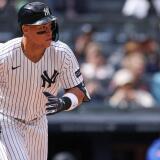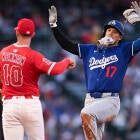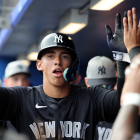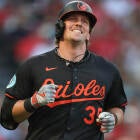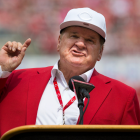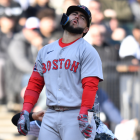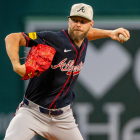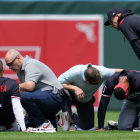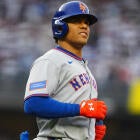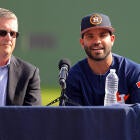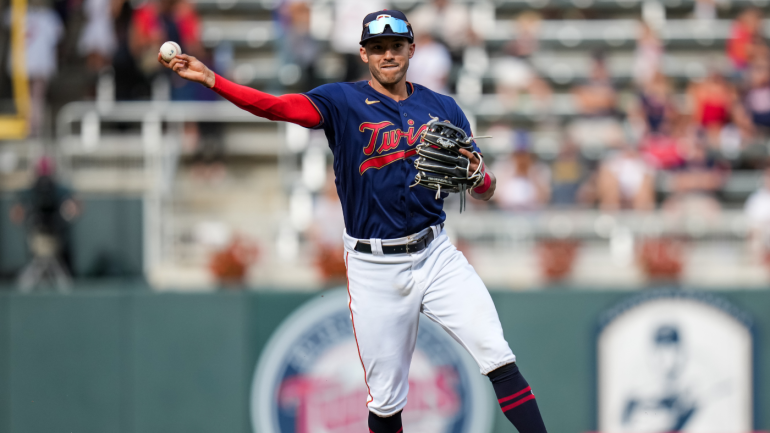
Is the Carlos Correa free agency saga finally at an end? After seeing tentative deals with the San Francisco Giants and New York Mets fall apart because of concerns about the ankle that Correa injured and had surgically repaired years ago as a minor leaguer, Correa and the incumbent Twins forged an agreement. That agreement is a six-year, $200 million pact that could be worth as much as $270 million if a series of vesting options kick in. At this writing, Correa's deal to return to the Twins is pending a physical, and that's obviously a major hurdle given recent events.
At this point, we're left with a few questions about what got Correa and the Twins to this point and what the road ahead might look like. Let's explore those very questions right now.
1. Will he pass the physical?
As noted above, Correa "failed" two physicals this offseason because of those ankle concerns. However, his Twins deal is for many fewer years and much less money than his accords with the Giants and Mets, and that in turn may reduce the club's concerns about Correa's ankle, which, by way of reminder, hasn't notably bothered him since. As well, after two lost deals the Twins and Correa's agent Scott Boras were no doubt highly communicative about possible contingencies stemming from the physical. As well, there's also this:
Sources: The major part of Correa’s physical is complete — including the ankle at issue — so there’s nothing foreseen to stop Correa’s return to the Twins
— Jon Heyman (@JonHeyman) January 10, 2023
Given the familiarity between team and player, what happened with the Mets and Giants, and the lessened cost and risk involved in this contract, a finalized deal – i.e., ink on paper – seems likely. It's also worth recalling that the Twins medically cleared Correa last winter for the three-year, $105.3 million deal he opted out of.
2. What does this mean for the Mets?
Likely, it means a reversion to the pre-Correa status quo. Correa has been poised to shift to third base in deference to Francisco Lindor, so there will be no upheaval at the shortstop position. What does change is the hot corner, where Eduardo Escobar will likely return to primary duty until prospect Brett Baty is ready. While Escobar is a solid player, he's a far cry from Correa. The larger matter is whether this changes the outlook in the NL East. The margins are tight between the Mets and Braves, just as they were last season, and subtracting Correa from the Mets' outlook may be enough to flip things back to Atlanta.
3. Will Steve Cohen realize any consequences for his public remarks?
Mets owner Steve Cohen, who right now is probably the best owner in the league thanks to his willingness to invest in his team's success, may have gotten a bit over his skis just after the now-dead Correa agreement achieved tentative status:
Steve Cohen on signing Carlos Correa via New York Post:
— Michael Mayer (@mikemayer22) December 21, 2022
“This really makes a big difference. I felt like our pitching was in good shape. We needed one more hitter. This puts us over the top.”
There's a reason teams or their owners don't comment publicly about contracts before those contracts are fully executed, and in Cohen's case it's possible he could see a repercussion or three from his Correa remarks. By speaking to the press about a deal that was still in the working stages, Cohen may have opened his team up to a grievance from the Major League Baseball Players Association now that the Mets have walked away.
4. Are the Giants slightly less embarrassed now?
Sure, maybe. That Correa's deal with the Mets fell apart suggests that the decline and fall of his Giants deal wasn't just a matter of San Fran ownership being stricken with buyer's remorse -- there are legitimate concerns with Correa, perhaps to the extent that it's difficult to insure a contract of such breadth. So that's notable. However, the single biggest pratfall of the offseason remains the Giants' decision to have Correa prepare for the introductory press conference before the contract was finalized.
5. Now that Correa is back in the fold, will the Twins win the AL Central?
To state the obvious, the Twins didn't win the Central in 2022 even with a standout season from Correa. No doubt, re-upping with Correa improves their chances of topping the Guardians at the top of the division, as do the additions of Christian Vázquez and Joey Gallo. Really, though, you can argue that Byron Buxton's health or lack thereof will be the primary driver when it comes to Minnesota's fortunes in 2023.
![[object Object] Logo](https://sportshub.cbsistatic.com/i/2020/04/22/e9ceb731-8b3f-4c60-98fe-090ab66a2997/screen-shot-2020-04-22-at-11-04-56-am.png)






